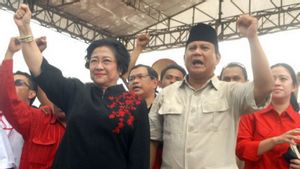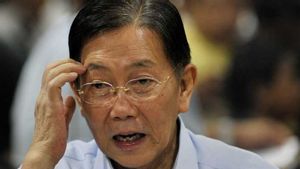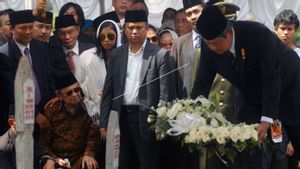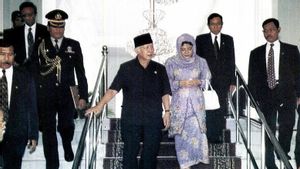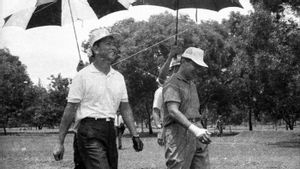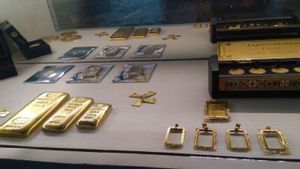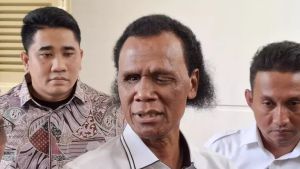JAKARTA - President Soekarno's love for books is second to none. For him, there are no days without reading. Moreover, Bung Karno's collection of books is piled up. Bung Karno considers books full of inspiration. He also wants all Indonesians to like to read.
His dream brought him closer to the figure of a businessman, Tjio Wie Tay (Masagung). The owner of the Gunung Agung Bookstore also has the same ideals. It was the same vision that made Soekarno entrust all books about him printed and circulated Mount Agung.
Books often accompany Soekarno's life journey. In fact, since Bung Karno was still studying in school. He was able to take advantage of his father's status, Raden Soekemi Sosrodihardjo as a member of the Theosofi association to read many books.
He was freely able to read any books that became a collection of large libraries from the association. His favorites for books then increased when he 'poiled' at the house of Haji Omar Said (HOS) Tjokroaminoto.
The figure of Sarekat Islam shared many things with Soekarno. Instead of just knowledge, Tjokroaminoto also shared the books he read. Bung Karno was aware of many, that books were his warehouse for science.
He believed that many world leaders thought he met through books. From Giuseppe Mazzini to Karl Marx. As a result, Bung Karno considered books to be the only most valuable asset. Especially when Bung Karno served a exile sentence in Ende (1934-1939), then Bengkulu (1938-1942).
He also dreams that all Indonesian people can like to read. That desire was welcome. Fate brought him together with a businessman. Tjo Wie Tay, his name. The selection of the Gunung Agung Bookstore often helps Soekarno's desire to supply books throughout the country. Bung Karno also fully supports the business of the man who is familiarly called Masagung.
Gunung Agung builds little by little a large three-story building in a small shop that used to be on Jalan Kwitang, Jakarta, and opens branches in Yogyakarta and Surabaya (both are university cities), then in important cities in West Irian, once the region officially became part of Indonesia in 1963.
Tjo Wie Tay's quick success, who took the name Indonesia Masagung in the same year. It can be explained partly by his close relationship with President Soekarno. Thus, although in other forms, we rediscovered the fellowship between businessman and ruler who used to also make China's Kapitan, Souw Beng Kong, rich in the 17th century, "explained historian Denys Lombard in the bookNusa Java Cross Culture: Asia Network (1996).
Soekarno, who is a book lover, certainly fell in love with Masagung's bookstore. Moreover, Bung Karno is often amazed by the book exhibition celebration presented by the Gunung Agung Bookstore. Therefore, the bookstore is considered as part of the executor of Indonesia's dream to educate the nation's children.
Bung Karno also acknowledged the great influence of the Gunung Agung store in spreading its ideology. As a result, Bung Karno then entrusted Masagung to monopolize his distribution of his work. Either written by Soekarno or someone else.
Soekarno is happy. Likewise with Masagung. The Gunung Agung Bookstore became famous throughout the country. All because Bung Karno's supporters flocked to buy books related to the Commander of the Revolution. Moreover, when Bung Karno issued his masterpiece Under the Flag of Revolution (1959).
The book, which contains the peak of Bung Karno's thoughts and creativity, has become an invasion of many people. There is no Bung Karno supporters who do not want to make Under the Revolutionary Flag a collection. The success of the book made Bung Karno participate in suggesting the publication of books about the others. Even the Gunung Agung Bookstore once again gets honor regarding its distribution.
This book was published by PT Gunung Agung, a publisher led by Masagung, a close friend of President Soekarno at a critical time. In the same year, the publisher published a book entitled Bung Karno Putra Fajar, written by Solichin Salam based on research and interviews with President Soekarno.
The book almost cannot be published, if there is no availability of PT Gunung Agung to issue it. Understandably, at that time, President Soekarno's position was in a difficult position due to the September 30th Movement event, which caused a number of publishers to be reluctant to publish it. When Soekarno was removed from his power and held a political prisoner, the situation of Desoekarnization driven by the New Order government occurred," explained historian Peter Kasenda in the book Bung Karno Panglima Revolution (2014).
SEE ALSO:
The English, Chinese, Japanese, Arabic, and French versions are automatically generated by the AI. So there may still be inaccuracies in translating, please always see Indonesian as our main language. (system supported by DigitalSiber.id)



